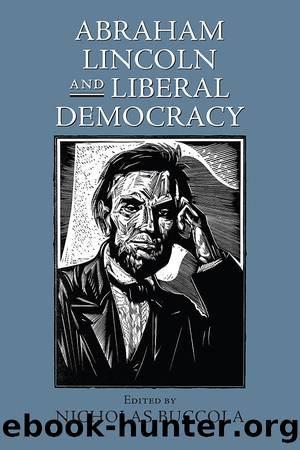Abraham Lincoln and Liberal Democracy by Nicholas Buccola

Author:Nicholas Buccola [Buccola, Nicholas]
Language: eng
Format: epub
Tags: History, United States, 19th Century, Political Science, Political Ideologies, Democracy, History & Theory
ISBN: 9780700622177
Google: UiOHvgAACAAJ
Goodreads: 27799227
Publisher: University Press of Kansas
Published: 2016-01-15T06:11:21+00:00
THE LINCOLN PARADOX: LEGALISM AND THE PROMISES OF LIBERALISM
In an 1845 letter to Liberty Party activist Williamson Durley, Lincoln declared that our âparamount duty ⦠to liberty itself (paradox though it may seem)â is to leave slavery alone where it exists.69 My aim in this essay has been to explain how Lincoln attempted to resolve this paradox. In an 1860 âfragmentâ on âThe Constitution and the Union,â Lincoln attempted to articulate his resolution. He began by declaring that âthe Constitutionâ and âthe Unionâ are important causes of our âgreat prosperityâ in the United States, but they are not the âprimary cause.â That place, he continued, belongs to âthe principle of âLiberty to allââ that finds its âexpressionâ in âour Declaration of Independence.â In the next few lines, Lincoln explored the relationship among the Constitution, the union, and the promise of universal liberty made in the Declaration:
The assertion of that principle, at that time, was the word, âfitly spokenâ which has proved an âapple of goldâ to us. The Union, the Constitution, are the picture of silver, subsequently framed around it. The picture was made, not to conceal, or destroy the apple; but to adorn, and preserve it. The picture was made for the appleânot the apple for the picture. So let us act, that neither the picture, or apple, shall ever be blurred, or broken. That we may so act, we must study, and understand the points of danger.70
This passage is one of Lincolnâs most eloquent defenses of the idea that the natural rights described in the Declaration were supposed to be preserved by the Constitution (and those laws authorized by it). His moral prescriptionââlet us act, that neither the picture, or apple, shall ever be blurred, or brokenââreflects his hope that legalism and natural rights might be reconciled.
In this essay, I have made the case that we need not conclude that Lincolnâs antebellum political thought was disingenuous. Contra the racial contract thesis, he did believe that African Americans were the bearers of natural rights, and contra the political expediency thesis, he was not simply a closeted abolitionist who lied about his true beliefs to get elected. Instead, Lincoln genuinely believed that he could be simultaneously committed to natural rights for all people and opposed to the idea that there was an obligation to abolish slavery. To justify this set of beliefs, Lincoln blended legalist ideas with natural rights doctrine. Rather than imposing a duty to do whatever was necessary to bring about the immediate fulfillment of the promise of natural rights for all people (as the abolitionists would have it), Lincolnâs legalist natural rights philosophy posited a duty to act in such a way that was most likely to bring about the eventual protection of the natural rights of all people. For Lincoln, a social ethos that placed respect and reverence for the law at the center of the moral universe was the best way to keep the public mind at rest while the public heart evolved toward justice.
In
Download
This site does not store any files on its server. We only index and link to content provided by other sites. Please contact the content providers to delete copyright contents if any and email us, we'll remove relevant links or contents immediately.
| Anarchism | Communism & Socialism |
| Conservatism & Liberalism | Democracy |
| Fascism | Libertarianism |
| Nationalism | Radicalism |
| Utopian |
The Secret History by Donna Tartt(19046)
The Social Justice Warrior Handbook by Lisa De Pasquale(12186)
Thirteen Reasons Why by Jay Asher(8889)
This Is How You Lose Her by Junot Diaz(6875)
Weapons of Math Destruction by Cathy O'Neil(6264)
Zero to One by Peter Thiel(5786)
Beartown by Fredrik Backman(5737)
The Myth of the Strong Leader by Archie Brown(5496)
The Fire Next Time by James Baldwin(5429)
How Democracies Die by Steven Levitsky & Daniel Ziblatt(5213)
Promise Me, Dad by Joe Biden(5141)
Stone's Rules by Roger Stone(5080)
A Higher Loyalty: Truth, Lies, and Leadership by James Comey(4950)
100 Deadly Skills by Clint Emerson(4919)
Rise and Kill First by Ronen Bergman(4778)
Secrecy World by Jake Bernstein(4740)
The David Icke Guide to the Global Conspiracy (and how to end it) by David Icke(4699)
The Farm by Tom Rob Smith(4502)
The Doomsday Machine by Daniel Ellsberg(4484)
